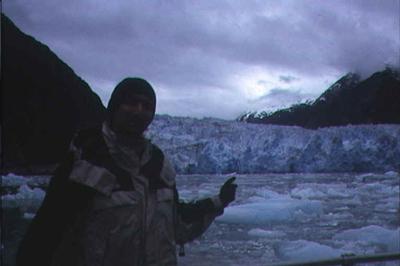10 August, 2001
Mentoring Plan
Don't let anyone convince you that this is a vacation. Today was a working day. After presentations this morning from Bruce Wellman on communication, we were turned loose to come up with mentoring plans. I like the idea of calling it a mentoring "proposal" even better. As a TEA parcticipant, we are required to enlist the association of at least three other teachers. Teachers are obligated to contribute 140 hours of mentoring time toward the transfer of polar research in their classrooms. Let me state my preliminary ideas for my mentoring proposal:
Cooperating Teachers:
1. Jeremy Newman (Biology and Physiology)
2. John Bell (Global Science)
3. Christine and Rob Funk (Biology and Elementary, respectively)
Optimum Situation:
Since all of us (except Rob) work within the same department, we should be able to meet at lunch at least once a week. I plan to make an announcement at the next department meeting suggesting that we contact the district for funding a curriculum development project. We would meet every other week after school to discuss possible curriculum and applications of polar science.
This mentoring would continue during the time I'm in Antarctica. One project I'm proposing to Jeremy is the idea of graphing my vital signs for his Physiology class throughout the next two years. I would send him data via e-mail and updates on external conditions. This same type of project could be done in John's class where weather, climate, and environmental data are sent to a Global Science class. The class could graph the data, but also correlate with real-time satellite data from the web. Chris and Rob could study acclimatization to Antarctic conditions by a variety of organisms through images and anecdotal information. Chris also mentioned wanting to do a unit on conditions that "plague the earth" for her International Baccalaureate students.
One outcome of this process will be the development of tangible polar activities. These can be compiled in a notebook for possible future publication or use by the TEA program. These activities will be adaptable for use by elementary and secondary teachers alike.
In addition to district funding or credit for this development, a portion of the stipend will be distributed among my team. I hope to have at least four members in case one cannot meet the commitment over the next three years. At the next in-service, I will make an announcement about TEA and my involvement, inviting other teachers to join me in sharing this research in their classrooms. This kind of announcement will also be made through the district's newsletters and in my meteorite class at the Denver Museum of Nature and Science. Any interested teachers in my district or museum will be encouraged to parcticipate.
I hope this "proposal" is broad enough that it can be modified. As we have been told on countless occasions, we need to "be flexible!" I have confidence in the TEA program's that they won't let me get too off track.

Mr. Caldwell teaching under Arctic conditons.
Contact the TEA in the field at
.
If you cannot connect through your browser, copy the
TEA's e-mail address in the "To:" line of
your favorite e-mail package.
|
